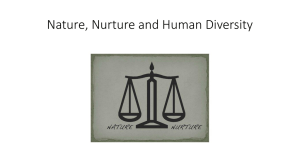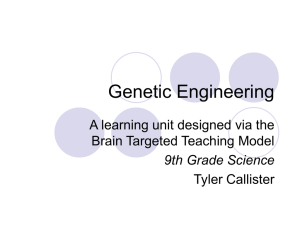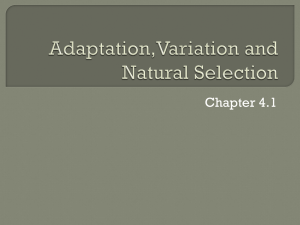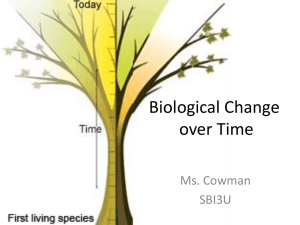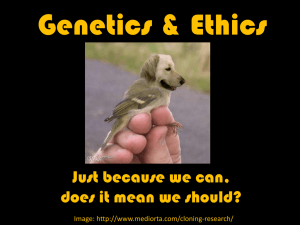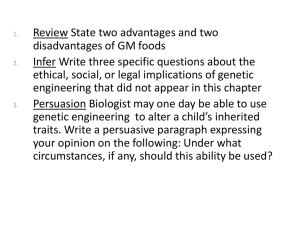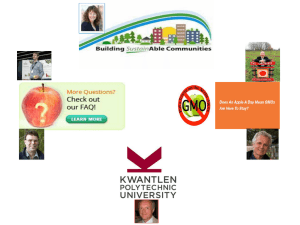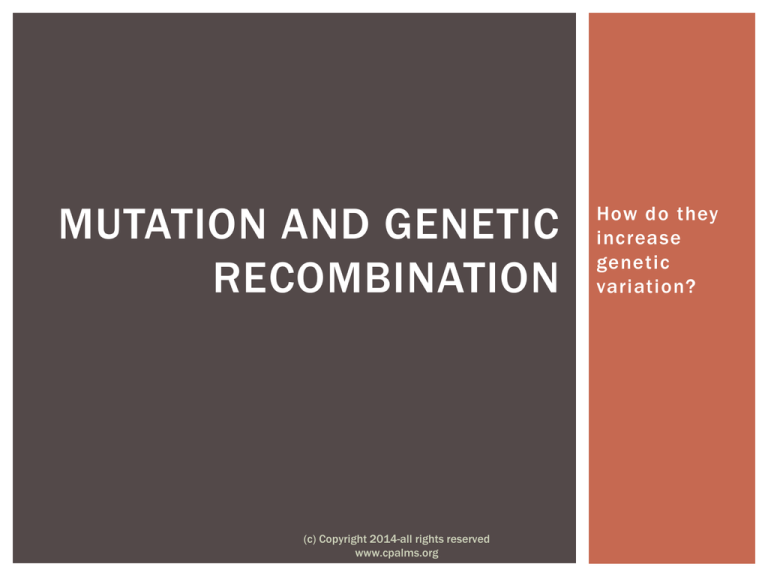
MUTATION AND GENETIC
RECOMBINATION
(c) Copyright 2014-all rights reserved
www.cpalms.org
How do they
increase
genetic
variation?
FLORIDA STANDARD
SC.912.L.15.15
Describe how mutation and genetic recombination increase genetic
variation.
(c) Copyright 2014-all rights reserved
www.cpalms.org
OBJECTIVE
By the end of this lesson you will be able to:
--Describe how mutation and genetic recombination occur
--Explain how mutations and genetic recombination increase genetic
diversity in a population
(c) Copyright 2014-all rights reserved
www.cpalms.org
REVIEW
What is the definition of a mutation?
A change in the structure of genes or chromosomes of an organism.
(nucleotides are altered)
Is a mutation natural or man made?
A mutation is natural
What examples of mutations can you give? (think the
direction of nucleotides)
Substitution
Addition
GENETIC RECOMBINATION
Definition: The exchange of genetic information in order to
increase the genetic diversity of the population.
This is seen in nature and can be man made
Man made genetic recombination is also call genetic engineering
How is genetic recombination used in our society?
Used for vaccines
Food
Bacteria
BACTERIAL GENETIC RECOMBINATION
Bacterial DNA can mutate and “trade” DNA with other
bacteria.
This “trade” can be beneficial and have negative ef fects.
White Board: What is one benefit and one negative ef fect of
bacterial genetic recombination?
One benefit is vaccines:
One negative is resistance to antibiotics
(c) Copyright 2014-all rights reserved
www.cpalms.org
RECOMBINATION AND FOOD
A big topic in our society at the moment is GMO ’s or
genetically modified organisms. Genetic engineering
simulates genetic recombination.
Food has been altered for many reasons a few of them are:
Pesticide resistant
Hinder bugs
Bigger food
Many stores and people are looking for organic foods that
have not been modified or exposed to pesticides.
Examples of GMO’s
Rice
Corn
(c) Copyright 2014-all rights reserved
www.cpalms.org
WHITE BOARD QUESTION
Describe the dif ference between mutations and genetic
recombination:
A. A mutation is man made while genetic recombination is natural
B. Both are man made occurrences
C. Mutations are changes in nucleotides while genetic recombination
is the transfer of genetic information
D. Genetic recombination is only seen in bacteria and mutations are
only seen in humans
(c) Copyright 2014-all rights reserved
www.cpalms.org
WHITE BOARD QUESTION
A gene from a large red apple is inserted in the the DNA of a
small yellow apple. The result is a medium sized red and
yellow apple. This is an example of:
A. Mutation
B. Bacteria
C. Mad scientists
D. Genetic recombination
-What would be an example of a mutation?
Many examples can be explain: An example would be a change in one
gene such as the BRCA -1 (breast cancer gene) which could give a greater
chance for the cancer.
(c) Copyright 2014-all rights reserved
www.cpalms.org
THE FUN STUFF!
Genetic Engineering is a
simulation of recombination in animals
A few examples:
Glow in the dark monkeys
Double muscled animals
Spider Goats
(c) Copyright 2014-all rights reserved
www.cpalms.org
WHITE BOARD QUESTION
How do mutations and genetic recombination increase genetic
diversity?
Both mutations and genetic recombination have changes in the
DNA that can be pasted onto of fspring. The of fspring could
then pass the changes onto their of fspring. This gives more
variety in a population.
(c) Copyright 2014-all rights reserved
www.cpalms.org
RECAP
Mutations have altered nucleotide sequences
Genetic recombination is the transfer of DNA either in nature
or man made
Genetic recombination occurs in bacteria and it can help with
vaccines. It can also be harmful with antibiotic resistance.
GMO’s are examples of simulated recombination and are
found everywhere!
Genetic diversity is increased do to the changes in this
modified DNA and can be passed onto of fspring
(c) Copyright 2014-all rights reserved
www.cpalms.org
COPYRIGHT AND CREDIT
© Copyright 2014-all rights reserved www.cpalms.org
Pictures:
http://www.ask4biology.com/wp content/uploads/2013/02/Gene-Mutation.jpg
www.belgiumblue/wp/upload/2001 .jpg
http://site.motifolio.com/images/The -Ti-plasmid-as-a-vectorin-plant-genetic-engineering-1021160.png
http://blogs.sundaymercury.net/weirdscience/monkey_x600.jp
g
http://ts4.mm.bing.net/th?id=HN.608041535371608322&pid
=1 .7
Marisa Colyer 2014
(c) Copyright 2014-all rights reserved
www.cpalms.org




